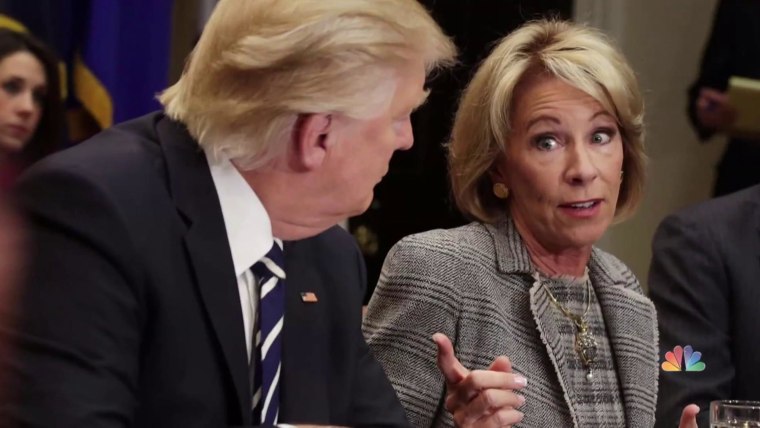Education Secretary Betsy DeVos’ revised federal guidelines on how sexual assault allegations should be handled on college and K-12 campuses is the target of a federal lawsuit filed Thursday, claiming the changes would “inflict significant harm” on victims and “dramatically undermine” their civil rights.
The suit, filed on behalf of four advocacy groups for sexual assault survivors, including Know Your IX and Girls for Gender Equity, is the first that attempts to block the Department of Education’s new provisions before they go into effect on Aug. 14.
The rules championed by DeVos effectively bolster the rights of due process for those accused of sexual assault and harassment, allowing for live hearings and cross examinations. It’s what agency officials say was lacking under the Obama administration to protect all students under Title IX, a 1972 law that prohibits gender discrimination, including sexual assault, at schools.
“This new federal effort to weaken Title IX makes it more difficult for victims of sexual harassment or sexual assault to continue their educations and needlessly comes amid a global pandemic,” according to the suit, which was filed in U.S. District Court in Maryland by the American Civil Liberties Union and the New York-based law firm Stroock & Stroock & Lavan LLP.
The suit names DeVos, the Education Department and Kenneth Marcus, the agency’s assistant secretary of civil rights. The department did not immediately respond to a request for comment about the complaint.
Let our news meet your inbox. The news and stories that matters, delivered weekday mornings.
DeVos last week denied that the final rule would discourage victims from coming forward to report abuse and instead, allows for schools to be more balanced in how they review claims, rather than through what she called a “kangaroo court” approach.
“We can continue to combat sexual misconduct without abandoning our core values of fairness, presumption of innocence and due process,” DeVos told reporters.
How schools should address sexual assault comes amid the larger #MeToo movement focusing on claims of misconduct that might otherwise go ignored. Schools that fail to adhere to Title IX requirements risk the loss of federal funding.
Advocates for accused sexual misconduct perpetrators and some civil liberties organizations have argued that the guidance under the Obama administration was too loose and didn’t properly afford the accused a presumption of innocence and hold schools to a standard of impartiality.
But the ACLU is among several groups that threatened legal action to halt the final Title IX changes, warning the Education Department it would “see you in court.”
Victim advocates are concerned students are “required to jump through hoops” to convince their respective schools to even open an investigation, Ria Tabacco Mar, director of the ACLU’s Women’s Rights Project, said Thursday.
The suit, she said, is challenging the Title IX regulations that will redefine sexual misconduct in more narrower terms, including that it must be “so severe, pervasive and objectively offensive” that it “denies a person equal access to the school’s education program or activity.” (The definition comports with how the Supreme Court regards sexual harassment.)
But Tabacco Mar argues that it creates a “double standard” for how schools must treat sexual discrimination complaints compared to how they handle allegations of race, national origin and disability discrimination.
In addition, the suit takes issue with how the rule will allow universities to investigate complaints that are only made through a formal process and to certain officials as opposed to any school employee. (The rule, however, does permit complaints in K-12 schools to be shared with any employee, which then must trigger an investigation.)
Download the NBC News app for breaking news and politics
The suit also argues that schools, under the final rule, can willfully ignore certain sexual assault complaints that might occur off-campus or during study abroad programs, and use a higher standard of proof for determining whether an accused student violated a code of conduct policy.
According to the suit, that would place “a heavier burden on those alleging sexual harassment than on students who allege other forms of harassment.”













